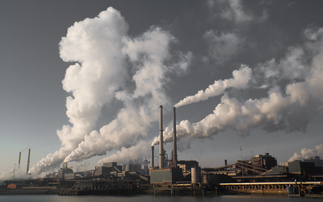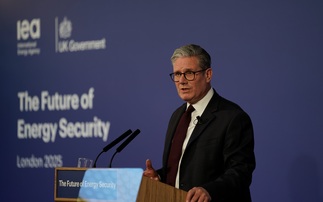When the 'House is on Fire' consumers are going to increasingly question business actions, argues Dario Kenner of Anglia Ruskin University
I have spent years researching the rich people who run oil and gas companies and how they have lobbied to keep the UK "addicted" to fossil fuels. I call them the polluter elite because often they are very wealthy and thus epitomise the trend of carbon inequality - the richest are most responsible for pollution via their consumption and investments. The other side of this inequality is that the polluter elite are the least affected by air pollution and extreme weather events.
In the UK over a million people depend on food banks and child poverty is soaring. As inequality increases it's only a matter of time before more and more direct connections are made between the increasing concentration of wealth in the hands of a minority of people, and those same people holding more responsibility for causing and deepening the climate crisis.
The polluter elite vs the Green New Deal
At the moment companies are probably looking towards the government to see how to adapt their business models to environmental legislation such as the commitment to net zero emissions by 2050. But they should also be watching the youth climate strikers because they are transforming what is politically possible and the minimum that is acceptable. On Friday last week they mobilised in unprecedented numbers. These are the consumers of the future and they are influencing their parents too - many adults joined the strike.
The young people are calling for a rapid decarbonisation over the next decade. They want to achieve this through a Green New Deal which would also aim to address inequality. This vision could entail huge changes in the structure of the economy, not just shifting from fossil fuels to renewable energy, so would impact on a wide range of companies, not just those already operating in the sustainability space.
The youth climate strikers already know the government is failing to act and are increasingly going to be calling out those companies that are blocking the transition. The most obvious blockers of the Green New Deal are the oil and gas companies (run by the polluter elite) who clearly have a deep interest in defending the dominance of fossil fuels.
It means the young people who are on the streets fighting for their very survival are going to be asking which side you are on. This means we are in an age when fluffy CSR is not going to be enough, a bit of relative energy efficiency here, or relative water efficiency there. They will judge you on whether you are contributing to securing their future or stealing it from them, not on reading positive case studies in your Sustainability Annual Report. They want to see companies taking concrete action to change their business models. They will want to know are you with them or the polluter elite?
Managing reputational and material risk
Just like the connections have already been made with the fires raging in the Amazon and the companies along the supply chain, the same is going to increasingly happen with the fossil fuel companies. There are going to be huge reputational and material risks (e.g. potential boycotts) associated with collaborating with the polluter elite. Indeed, expect the fossil fuel companies to be increasingly cast as climate criminals. Oil, gas and coal companies (and the people who run them) are already facing more and more strategic climate litigation.
How could the business community reduce its association with the polluter elite? Of course there are a number of companies who are already publicly committing to reducing emissions and some are going further by trying to respond concretely to the climate emergency. But what else could companies do? They could do more to remove themselves from the polluting supply chains as much as possible, and as soon as possible i.e. going beyond making a commitment to get to net zero emissions by 2040 or 2050 as major companies have done.
This means companies not just shifting to renewable electricity at a future date. It means not buying raw materials or processed products from the oil, gas, coal companies in the short-term.
A concrete example of this is to ask: are your products covered in plastic? If they are then you are part of the oil and petrochemical supply chain. When you buy more plastic this increases demand for the raw material oil and therefore the profits of the polluter elite. Of course, it is not easy to immediately start shifting how you source your materials. That's why being able to show you are taking the steps to do that is a start, such as by adopting circular economy approaches and using biodegradable packaging. Ultimately, for there to be an economy-wide shift government will have to step in to prohibit and incentivise viable substitutes to fossil fuel based materials.
The youth climate strikers are not campaigning for one sector-specific policy or to protect one species like cuddly polar bears. This is not some cool thing to do for a few months. The chant I heard on Friday at the global climate strike was: "Whose future? Our future". The business community needs to respond to these future consumers by showing them what they are going to do immediately and in practice to tackle the climate crisis.
Dario Kenner is the author of Carbon Inequality: The role of the richest in climate change and created the Polluter Elite Database. He's also a visiting fellow at Anglia Ruskin University.








